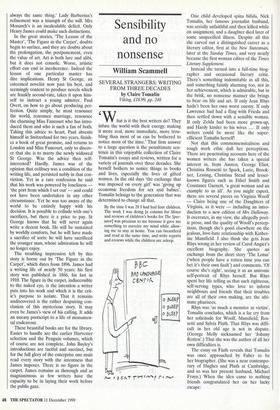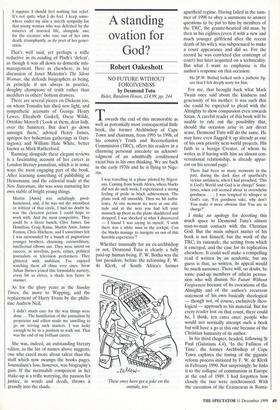Sensibility and no nonsense
William Scammell
SEVERAL STRANGERS: WRITING FROM THREE DECADES by Claire Tomalin Ming, L18.99, pp. 248
G
What is it the best writers do? They infuse the world with their energy, making it more real, more immediate, more trou- bling than most of us can be bothered to notice most of the time.' That firm answer to a large question is the penultimate sen- tence in this enjoyable collection of Claire Tomalin's essays and reviews, written for a variety of journals over three decades. She herself bothers to notice things in books and lives, especially the lives of gifted women. In the old days 'the exchange that was imposed on every girl' was 'giving up economic freedom for sex and babies'. Tomalin belongs to the generation that was determined to change all that.
By the time I was 28 I had had four children. The work I was doing [a column for Motor and reviews of children's books for The Spec- tator] was precious to me because it gave me something to exercise my mind while allow- ing me to stay at home. You can breastfeed and read at the same time, and write reports and reviews while the children are asleep. One child developed spina bifida, Nick Tomalin, her famous journalist husband, was serially unfaithful and then killed while on assignment, and a daughter died later of some unspecified illness. Despite all this she carved out a distinguished career as a literary editor, first at the New Statesman, later at the Sunday Times, and very nearly became the first woman editor of the Times Literary Supplement.
Instead she turned into a full-time biog- rapher and occasional literary critic. There's something indomitable in all this, and something faintly alarming too, not in her achievement, which is admirable, but in the brisk, no nonsense manner she brings to bear on life and art. If only Jean Rhys hadn't been her own worst enemy. If only Lawrence had had a fling with Frieda and then settled down with a sensible woman. If only Zelda had been more grown-up, and Hardy kinder to his wives ... If only writers could be more like the super- efficient Tomalin herself!
Not that this commonsensicalness and tough work ethic dull her perceptions. There are penetrating accounts here of the women writers she has taken a special interest in, from Austen, George Eliot, Christina Rossetti to Spark, Lurie, Brook- ner, Lessing, Christina Stead and lesser- known figures such as Ethel Smith and Constance Garnett, 'a great woman and an example to us all'. As you might expect, there are several pieces on Virginia Woolf — Claire being one of the Daughters of Virginia, as it were — including an intro- duction to a new edition of Mrs Dalloway. It overrates, in my view, the allegedly poet- ic prose, and the quality of Woolf s percep- tions, though she's good elsewhere on the jealous, love-hate relationship with Kather- ine Mansfield. I also think she gets Jean Rhys wrong in her review of Carol Angier's excellent biography. She quotes an exchange from the short story 'The Lotus' ('when people have a rotten time you can bet it's their own fault') and comments, 'Of course she's right', seeing it as an unironic self-portrait of Rhys herself. But Rhys spent her life telling us that such righteous, self-serving types, who love to inform neighbours and friends that their troubles are all of their own making, are the ulti- mate pharisees.
Rhys was 'as much a monster as victim', Tomalin concludes, which is a far cry from her solicitude for Woolf, Mansfield, Ros- setti and Sylvia Plath. That Rhys was diffi- cult in her old age is not in dispute. (George Melly nicknamed her 'Johnny Rotten'.) That she was the author of all her own difficulties is.
The essay on ilath reveals that Tomalin was once approached by Faber to be her biographer. (She was a near contempo- rary of Hughes and Plath at Cambridge, and so was her present husband, Michael Frayn.) When the idea came to nothing friends congratulated her on her lucky escape:
I suppose I should feel nothing but relief. It's not quite what I do feel, I keep some- where under my skin a sisterly sympathy for that young woman who was defeated by the miseries of married life, alongside awe for the creature who rose out of her own death, triumphantly, as the poet of her gener- ation.
That's well said, yet perhaps a trifle reductive in its reading of Plath's 'defeat', as though it was all down to domestic mis- management. Here as elsewhere, in her discussion of Janet Malcolm's The Silent Woman, she defends biographers as being, in principle if not always in practice, doughty champions of truth rather than meddlers in others' bottom drawers.
There are several pieces on Dickens too, on whom Tomalin has shed new light, and sympathetic accounts of George Henry Lewes, Elizabeth Gaskell, Oscar Wilde, Ottoline Morrell ('Look at them, dear lady, over the banisters. But don't go down amongst them,' advised Henry James, apropos her bohemian gatherings at Gars- ington), and William Hale White, better known as Mark Rutherford.
Running alongside these elegant reviews is a fascinating account of her career in London literary jounalism, which is in some ways the most engaging part of the book. After learning something of publishing at Heinemann, and the editorial trade at the New Statesman, she was soon nurturing her own stable of bright young things.
Martin [Antis] was unfailingly good- humoured, and, if he was not the smoothest or wittiest of that circle, I had no doubt he was the cleverest person I could hope to work with. And the most competitive. They could be a fierce bunch, Clive James, Ian Hamilton, Craig Raine, Martin Antis, James Fenton, Chris Hitchens, and I sometimes felt I was surrounded by a bunch of pugnacious younger brothers, charming, extraordinary, intellectual elbows out. They were intent on success, as novelists, poets, critics, political journalists or television performers. They glittered with ambition. I've enjoyed watching them all shine ever since. Soon Julian Barnes joined this formidable nursery, every bit as clever, a shade less fierce in manner.
As for the glory years at the Sunday Times, the move to Wapping, and the replacement of Harry Evans by the philis- tine Andrew Neil,
I didn't much care for the way things were done ... The humiliation of the journalists by proprietor and editor made me unwilling to go on serving such masters. I was lucky enough to be in a position to walk out. That was the end of my brilliant career.
She was, indeed, an outstanding literary editor, as the list of names above suggests, one who cared more about talent than the stuff which now swamps the books pages. Journalism's loss, however, was biography's gain. If the memsahib component in her make-up is a trifle worrying, the passion for justice, in words and deeds, throws it grandly into the shade.



























































































 Previous page
Previous page